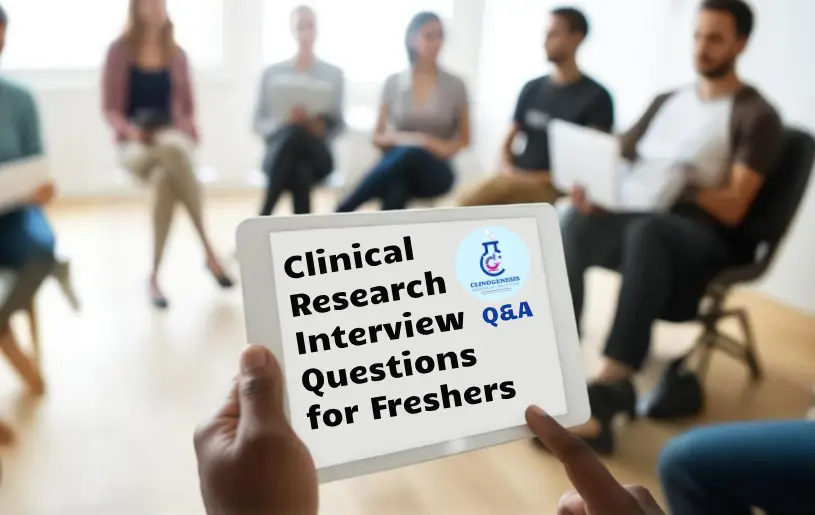Entering the clinical research field as a fresher can be an exciting yet daunting experience. To help you excel in interviews and land your first job in clinical research, we have put together this guide covering all the important clinical research interview questions for freshers.
Whether you’re applying for clinical research jobs for freshers in India or looking to start a career in clinical trials globally, understanding the type of questions asked and preparing effectively is the first step!
In this article, we’ll cover commonly asked interview questions along with tips on how to answer them. We’ll also discuss key concepts in clinical research, providing you with practical insights that can help you shine in your interviews.
1. What is Clinical Research?
This is one of the most common and fundamental clinical research interview questions for freshers. Interviewers want to gauge your understanding of the field.
Answer: Clinical research involves the study of health and illness in people, focusing on understanding diseases, developing treatments, and improving healthcare outcomes. Clinical research can include clinical trials, observational studies, and laboratory-based research to evaluate the safety and efficacy of drugs, devices, or treatment protocols. It plays a critical role in bringing new therapies and medical devices to market.
2. What are the Phases of Clinical Trials?
Understanding the different phases of clinical trials is crucial for anyone stepping into the field of clinical research.
Answer: Clinical trials typically consist of four phases:
Phase I: Tests the safety of a new treatment or drug on a small group of people to determine the right dosage.
Phase II: Involves a larger group to further assess the drug’s efficacy and side effects.
Phase III: Expands testing to thousands of participants across various locations to confirm the drug’s effectiveness and monitor adverse reactions.
Phase IV: Conducted after the drug is approved by regulatory bodies, focusing on long-term effects, safety, and effectiveness in a larger population.
3. What is the Role of a Clinical Research Associate (CRA)?
Many clinical research jobs for freshers in India begin with roles like Clinical Research Associate (CRA). This question tests your understanding of what the job entails.
Answer: A Clinical Research Associate (CRA) ensures that clinical trials are conducted following regulatory requirements and ethical standards. They monitor the progress of the trial, verify data accuracy, ensure patient safety, and liaise between the research team and sponsor. CRAs are vital in ensuring that the clinical trials are conducted smoothly and in compliance with all regulatory bodies.
4. Can You Explain Good Clinical Practice (GCP)?
When preparing for interviews, it is important to familiarize yourself with clinical research questions examples based on industry standards like GCP. This question assesses your knowledge of the ethical and scientific standards involved in clinical research.
Answer: Good Clinical Practice (GCP) is a set of guidelines ensuring the safety, integrity, and confidentiality of trial subjects. GCP covers protocols for conducting clinical trials, protecting participant rights, and ensuring data reliability. All clinical trials must adhere to GCP guidelines to be accepted by regulatory authorities like the FDA or DCGI.
5. How Do You Handle Ethical Issues in Clinical Research?
This is one of the clinical trials interview questions and answers that tests your ethical judgment and awareness of potential issues in research.
Answer: Ethical issues in clinical research primarily revolve around patient safety, consent, and confidentiality. Handling ethical issues involves ensuring informed consent is properly obtained from all participants, maintaining strict confidentiality of patient data, and ensuring that trials do not pose undue risk to participants. Ethical concerns should always be escalated to the ethics committee or Institutional Review Board (IRB) for guidance.
6. What Are the Responsibilities of a Clinical Data Manager?
A clinical data manager plays a pivotal role in managing data collection and ensuring data integrity during a clinical trial.
Answer: A clinical data manager ensures the accurate collection, management, and analysis of data generated during a clinical trial. They work closely with investigators to set up databases, monitor the data for inconsistencies, and ensure that the data complies with regulatory standards. Their work is critical in providing reliable results from clinical research.
7. Can You Explain the Difference Between Clinical Research and Clinical Practice?
This is another common clinical research interview question for freshers that tests your understanding of the distinction between research and direct medical practice.
Answer: Clinical research involves conducting studies to evaluate medical, surgical, or behavioral interventions and generate new knowledge. It is concerned with testing new treatments, drugs, and procedures to determine their safety and efficacy. In contrast, clinical practice refers to the application of established treatments in patient care.
8. What Are Some Common Challenges Faced During Clinical Trials?
This question explores your problem-solving abilities and understanding of the challenges in the field.
Answer: Some common challenges include recruiting and retaining participants, managing regulatory compliance, dealing with unforeseen side effects, data inconsistencies, and ensuring strict adherence to trial protocols. Effective communication, strong organizational skills, and ethical decision-making can help address these challenges.
9. How Do You Ensure Patient Safety During a Clinical Trial?
Ensuring patient safety is the foundation of clinical research, and this question assesses your understanding of the precautions needed.
Answer: Patient safety is ensured through careful monitoring, informed consent, regular health checks, and adverse event reporting systems. GCP guidelines must be followed at all stages, and any safety concerns must be immediately addressed with the ethics committee and regulatory bodies. Participant well-being should always be the top priority.
10. Why Do You Want to Pursue a Career in Clinical Research?
Employers ask this to understand your motivation and passion for the field.
Answer: I am passionate about clinical research because it allows me to contribute to the development of new therapies that can improve patient care and health outcomes. I am excited by the prospect of working in a field that combines science, ethics, and patient care. The opportunity to be part of a team that makes a tangible difference in healthcare is what drives me.
How ClinoGenesis Can Help You Succeed
Entering the world of clinical research can seem challenging, but with the right preparation, you can excel in your interviews and secure a role in this rewarding field. Understanding common clinical research interview questions for freshers and preparing answers thoughtfully can set you on the path to success.
At ClinoGenesis Research Institute, we offer specialized courses in clinical research designed to equip freshers with the skills and knowledge needed to thrive in the industry. Our programs not only provide essential training but also assist you in finding clinical research jobs for freshers in India.
With hands-on experience and guidance from industry experts, we can help you build a strong foundation and start your career with confidence.




